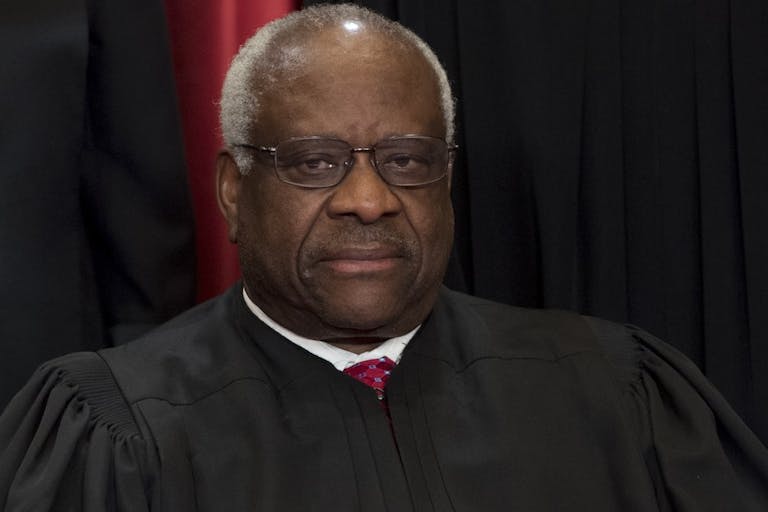
VICTORY: Spain criminal court acquits 21 pro-life prayer vigil participants
Angeline Tan
·
Justice Clarence Thomas: ‘Our abortion precedents are grievously wrong and should be overruled’
The women of Louisiana were dealt a blow Monday when the Supreme Court of the United States decided once again that their safety is not important as long as they have abortion access. By a vote of 5-4 in the case of June Medical Services v. Russo, the Court struck down a Louisiana law requiring physicians at abortion facilities in the state to be held to the same standard as other ambulatory surgical center physicians. The majority decided that abortionists are not required to hold admitting privileges to area hospitals as all other outpatient surgical center physicians do. In his dissent, Justice Clarence Thomas pointed out major flaws in the decision, including the disregard for the reason SCOTUS accepted the case, the lack of support for abortion in the Constitution, and the fact that SCOTUS does not have jurisdiction to claim Louisiana’s law is unconstitutional.
“Our abortion precedents are grievously wrong and should be overruled,” Justice Thomas wrote. “Because we have neither jurisdiction nor constitutional authority to declare Louisiana’s duly enacted law unconstitutional, I respectfully dissent.”
Thomas argued in his dissent that the reason SCOTUS accepted the June Medical case was “specifically to address whether ‘abortion providers [can] be presumed to have third-party standing to challenge health and safety regulations on behalf of their patients….'” But, he said, the Court ignored this question completely.
Thomas argued that the Court has long maintained that private parties can not bring about a suit in regards to the constitutional rights of individuals who are not plaintiffs in the case. Therefore, the plaintiffs (abortionists) in June Medical Services v. Russo do not have the right to challenge the Louisiana law regarding admitting privileges.
“Because this right [to abortion] belongs to the woman making that choice, not to those who provide abortions, plaintiffs cannot establish a personal legal injury by asserting that this right has been violated,” wrote Thomas. “The only injury asserted by plaintiffs in this suit is the possibility of facing criminal sanctions if the abortionists conduct abortions without admitting privileges in violation of the law,” he added.
This distinction is important. With admitting privileges, abortionists would be held to a higher standard than they currently are because hospitals would check their credentials. Currently, abortion businesses in Louisiana do not run background checks or verify a doctor’s credentials before hiring. With an admitting privileges requirement, doctors like these would be much less likely to be granted admitting privileges. According to the Amici Curiae brief in this case, the medical director at June Medical Services (the plaintiff) admitted that “he neither performed background checks nor inquired into their previous training before bringing in new doctors.”
This is truly shocking and unquestionably puts women at significant risk.

Since the plaintiffs in this case “lack standing,” said Thomas, SCOTUS therefore “lack[s] jurisdiction….”
However, he argues, even if the plaintiffs in June Medical Services v. Russo had standing to bring the suit, “the Court would still lack the authority to enjoin Louisiana’s law, which represents a constitutionally valid exercise of the State’s traditional police powers.”
The Constitution, he argued, does not place any constraints on the ability of the states to place restrictions on abortion or even prohibit abortion as they see fit. Therefore, the Supreme Court does not have jurisdiction over Louisiana’s laws put in place by the legislators of the state.
Article continues below
Dear Reader,
In 2026, Live Action is heading straight where the battle is fiercest: college campuses.
We have a bold initiative to establish 100 Live Action campus chapters within the next year, and your partnership will make it a success!
Your support today will help train and equip young leaders, bring Live Action’s educational content into academic environments, host on-campus events and debates, and empower students to challenge the pro-abortion status quo with truth and compassion.
Invest in pro-life grassroots outreach and cultural formation with your DOUBLED year-end gift!
READ: Supreme Court narrowly strikes down Louisiana’s abortion admitting privileges law
The Supreme Court legalized abortion in 1973 based on the idea that abortion rights are about privacy.
Thomas argued that the Supreme Court first began using this “free-floating constitutional right to privacy” in Griswold v. Connecticut — the 1965 case that centered around birth control. SCOTUS ruled in that case that a state law prohibiting the use of contraception was unconstitutional because it infringed on married couples’ “right to privacy.”
But that “right to privacy” was not a “constitutional guarantee” meant to prevent the “intrusion” of the government, said Thomas. Eight years later, SCOTUS returned to the “right to privacy” argument in the decision of Roe v. Wade. At that time, said Thomas, the Court acknowledged that the Constitution did not provide a right to privacy, but because of Griswold, it did not refer to the text of the Constitution. Instead, it fell back on the Griswold ruling in order to legalize abortion.
“Without any legal explanation, the Court simply concluded that this unwritten right to privacy was ‘broad enough to encompass a woman’s [abortion] decision,'” he wrote.

“Roe is grievously wrong for many reasons,” wrote Thomas, “but the most fundamental is that its core holding — that the Constitution protects a woman’s right to abort her unborn child — finds no support in the text of the Fourteenth Amendment.”
Instead of supporting the right to abortion, Thomas argued that Roe deprives individuals of liberty while simply requiring that this deprivation be protected. He calls it absurd that anyone would believe that the crafters of the Fourteenth Amendment would have meant to include a right to abortion.
“The fact that it took this Court over a century to find that right,” he argued, “all but proves that it was more than hidden — it simply was not (and is not) there.”
“Like” Live Action News on Facebook for more pro-life news and commentary!
Live Action News is pro-life news and commentary from a pro-life perspective.
Contact editor@liveaction.org for questions, corrections, or if you are seeking permission to reprint any Live Action News content.
Guest Articles: To submit a guest article to Live Action News, email editor@liveaction.org with an attached Word document of 800-1000 words. Please also attach any photos relevant to your submission if applicable. If your submission is accepted for publication, you will be notified within three weeks. Guest articles are not compensated (see our Open License Agreement). Thank you for your interest in Live Action News!

Angeline Tan
·
Pop Culture
Cassy Cooke
·
International
Cassy Cooke
·
Analysis
Cassy Cooke
·
Analysis
Angeline Tan
·
Analysis
Cassy Cooke
·
Politics
Nancy Flanders
·
Activism
Nancy Flanders
·
Issues
Nancy Flanders
·
Human Interest
Nancy Flanders
·
Investigative
Nancy Flanders
·